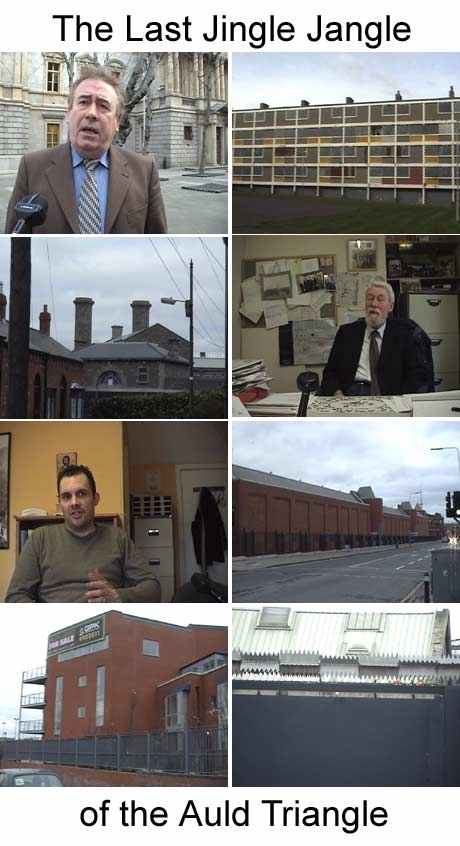VIDEO: "The Last Jingle Jangle Of The Auld Triangle" (Mountjoy Closure & Super Prison Construction)
 dublin |
miscellaneous |
feature
dublin |
miscellaneous |
feature  Tuesday March 01, 2005 14:45
Tuesday March 01, 2005 14:45 by kevin
by kevin
Short film about Mountjoy closure & building of new super prison in north Co. Dublin
 Does the introduction of PPP schemes into prison building also signal the introduction of private prisons? Security companies like Wackenhut and Group4 operate prisons in the UK and USA. Private prisons are routinely condemned by human rights groups. But what are the alternatives to building a new superprison in north Co. Dublin? What other options are open to the Minister for Justice?
Does the introduction of PPP schemes into prison building also signal the introduction of private prisons? Security companies like Wackenhut and Group4 operate prisons in the UK and USA. Private prisons are routinely condemned by human rights groups. But what are the alternatives to building a new superprison in north Co. Dublin? What other options are open to the Minister for Justice?
In this short film, Joe Costello from the Labour Party (a regular commentator on prison issues and prisoners rights), Rick Lines from the Irish Penal Reform Trust, and Seanie Lambe from ICON (Inner City Organisations Network, a community organisation based in the Summerhill area) give their opinions on the closure of Mountjoy. Issues discussed include the implications of private companies' involvement in the construction of the new prison, what will probably happen with the existing site, and different initiatives that could be put forward to combat crime at its source, rather than continually incarcerating people & building bigger prisons.
Click on the Feature Continued Link for Full Intro and Infromation on how to Download
Video for you to download. File is over 175 MegaBytes in size, so realistically it is not viewable if you only have a dialup connection - broadband or network connection to the intenet is a pre-requisite.
In 1847 the British Authorities passed a law enabling the Commission of Public Works to purchase land for a new prison. Two thousand pounds was granted by the Treasury for the construction of Mountjoy. The original site for the prison was at North Wall Quays, so prisoners could be easily loaded onto convict ships in the harbour. The lack of a fresh water supply, coupled with the foul smell from the river which would make life unbearable for inmates, meant that the prison was moved elsewhere.
Mountjoy Prison opened its doors in March 1850. It is located on the banks of the Royal Canal in Phibsborough, a northside inner suburb of Dublin. Since 1850, over half a million prisoners have passed through its doors, mostly from working class communities around the city. Now, after more than 150 years, the Minister for Justice has decided to close the prison. A new super-prison is to be built in rural north Co. Dublin, roughly 12 miles from the city centre. The new prison is to be built under a PPP scheme - a Public-Private Partnership. This means a private company will be given the contract to construct the prison in conjunction with the state.
In the last ten years with the advent of the Celtic Tiger economy, property prices in Dublin have skyrocketed. Inner city working class areas, previously neglected, have experienced massive redevelopment, primarily consisting of expensive apartments and office spaces. In many cases, people on lower incomes or those that have grown up in these areas are pushed out of the market. Mountjoy is very close to Dublin city centre. The lands around the prison are worth a considerable amount of money. The sale of the prison to private investors could generate millions of Euro for the state. This is considered to be one of the reasons for the sale of the prison.
Does the introduction of PPP schemes into prison building also signal the introduction of private prisons? Security companies like Wackenhut and Group4 operate prisons in the UK and USA. Private prisons are routinely condemned by human rights groups. But what are the alternatives to building a new superprison in north Co. Dublin? What other options are open to the Minister for Justice?
In this short film, Joe Costello from the Labour Party (a regular commentator on prison issues and prisoners rights), Rick Lines from the Irish Penal Reform Trust, and Seanie Lambe from ICON (Inner City Organisations Network, a community organisation based in the Summerhill area) give their opinions on the closure of Mountjoy. Issues discussed include the implications of private companies' involvement in the construction of the new prison, what will probably happen with the existing site, and different initiatives that could be put forward to combat crime at its source, rather than continually incarcerating people & building bigger prisons.
The film is just under 18 minutes long and is in the MPEG film format (MPEG1). You can download the film by right-clicking or Ctrl-Clicking here and saving the target onto your computer. It will play with most if not all operating system media players.
The MPEG1 film is a PAL VCD-Compliant file, so you can burn it onto a VCD and distribute it cheaply. If you are interested in a DVD or VHS copy of the film for screening then please contact Indymedia Éire.